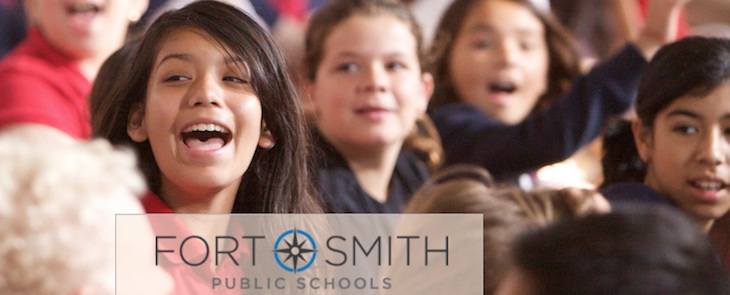Fort Smith schools receive coding grant, move forward new teacher negotiation policy
by January 28, 2019 8:30 pm 783 views

Fort Smith Public Schools received a $24,800 Innovation in Computer Science Grant that will provide teacher training and coding tools for all elementary and junior high schools. A report on the grant was presented to the Fort Smith Public Schools Board of Education at its regular meeting Monday (Jan. 28).
The grant allowed for one teacher from each elementary and junior high school to receive one day of training Wednesday (Jan. 23) on fifth- through eighth-grade Arkansas Computer Science standards, lesson and curriculum computer science resources, and implementation strategies, according to grant information.
That training will be used to accommodate the grant’s main objective — after-school coding clubs, said Eden Buergler, FSPS technology integration specialist, in an earlier interview with Talk Business & Politics. There will also be four webinars available for teachers.
Almost 60% of the grant funding will go toward teacher training with the other 40% going towards coding tools for each school. Teacher training funds — $14,500 — will cover the cost of the Jan. 23 training, stipends for facilitating coding clubs and summer learning. The $10,300 for tech tools will cover 25 coding sets.
Coding clubs will begin the week of Feb. 4 and include a video introduction by a local businessperson highlighting the role computer science plays in their respective business or industry, Buergler said. Clubs are geared for fifth and sixth-graders, but are open to all students.
“We will live-stream the clubs and make archived recordings available to families who are unable, attend in person. Students, teachers, parents, and community members will be able to create reflective videos of their experiences with the computer science activities to share with one another, developing a collaborative forum of ideas and questions,” Buergler said in the information provided for the grant.
Clubs will meet one hour a week, once a week for 12 weeks. Students will be exposed to various types of coding tools and platforms during the coding clubs that will help improve their computational thinking, problem-solving and math skills, Buergler said in an earlier interview.
“By providing a video tool for reflection, students will be able to use their voice to share their expertise with others. Reflecting, explaining and defending their learning are difficult skills to teach, but ones that will help students as they begin curating digital portfolios of their school projects. As more universities and colleges move toward interdisciplinary majors that involve computer science, this program will support students who choose to follow the path toward higher education. The career connection of the grant will provide awareness of skills needed to perform well specific computer science related jobs,” Buergler noted in grant information.
One of the biggest benefits the coding clubs will bring to students is that it will show them the many roles coding plays in every industry with a heavy focus on areas of education, healthcare, sports and fine arts, Buergler said.
“Students will learn how it plays a part in any career they chose in life, even music, art and theater,” she said, adding organizers also hope to increase enrollment in high school computer science, physics and higher math classes, increase teacher capacity and understanding of the state computer science standards, and to encourage teacher involvement in statewide and national computer science initiatives.
Space is limited for the clubs due to the basic space limitations of where the clubs will meet at the schools, but the video streaming will allow more families, parent and students to take part and learn from the clubs, Buergler said. In May, students and their families will attend a club celebration where they can win various coding toys, like Speros aor Ozobots, Buergler said. Coding education for students will continue through the summer with coding clubs at Fort Smith Public Libraries through a collaboration with the schools and FSPL.
TEACHER NEGOTIATION CHANGE
In other business at the meeting, Superintendent Dr. Doug Brubaker reported on progress of the Personnel Policy Committee. The Arkansas State Board of Education (SBE) voted Dec. 13 to approve FSPS request for a two-year waiver that would allow for the formation of a PPC that will negotiate on behalf of district teachers.
The FSPS Board of Education voted Nov. 26 to change the way the district negotiates with teachers regarding personnel policy and salaries, moving from negotiating with the Fort Smith Education Association (FSEA), formerly the Fort Smith Classroom Teachers Association (FSCTA), towards negotiating with a personnel policy committee made up of teachers from each of the district’s 27 campuses.
Nominations for the 35 representatives to the PPC were taken Friday, Brubaker said, noting there were 200 nominations submitted. The district contracted with American Arbitration Association to coordinate the development of the PPC. The total cost of this election is projected to be $8,000-$9,500, information on the FSPS website states.
“The agreement with the American Arbitration Association, the election services provider, guarantees that the balloting will be secret and that a third party will tabulate the results in compliance with our district’s waiver,” the site states.
Election ballots will be created, and candidates will have the opportunity to answer questions. Elections will be Feb. 11-15, and the first meeting of the new PPC will be Feb. 28, Brubaker said.
